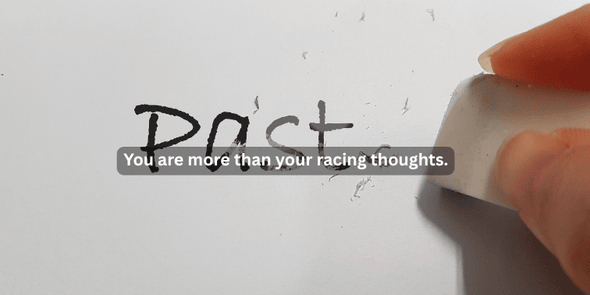“You’re not weak for spiraling. You’re just overwhelmed—and deserving of peace.”
Introduction: When Your Thoughts Won’t Let You Breathe
You’re lying in bed at 2 a.m., staring at the ceiling. Your mind is racing, bouncing from one worry to the next like a pinball in a never-ending game. You replay conversations, rethink decisions, question your future, and spiral into “what ifs” that never stop. Sound familiar?
In a world that never slows down, overthinking can feel like a silent storm—one that rages inside your head while everything on the outside looks calm. If you’ve ever felt mentally exhausted, caught in endless loops of self-doubt, or emotionally drained from trying to control what you can’t, know this: you’re not alone, and it doesn’t have to stay this way.
This blog is your guide to gently untangle the knots of anxiety and thought spirals. You’ll learn emotional reset techniques, calming breath practices, and ways to stop overanalyzing when everything feels out of control. Together, we’ll explore how to regulate your emotions, restore your nervous system, and find moments of mental peace—even in chaos.
What Is Overthinking Really About?
Overthinking is more than “thinking too much.” It’s a mental pattern where thoughts loop, amplify fear, and resist resolution. It’s analyzing past actions, fearing future scenarios, and feeling stuck in the uncertainty of now.
It often begins with a trigger—a moment of stress, a conflict, a fear of making the wrong choice. Your brain enters “protection mode,” scanning for answers and safety. But instead of finding peace, you dive deeper into thought spirals, overanalyzing every detail, creating scenarios that rarely come true.
You might second-guess everything from small decisions to your entire self-worth. You question your job, your relationships, your life path. Your mind feels like it never shuts off, leading to brain fog, mental fatigue, and a constant sense of being overwhelmed.
Overthinking is your nervous system trying to protect you—but in doing so, it often leaves you paralyzed by anxiety and emotionally depleted.
Why We Struggle With Overthinking
Overthinking is often misunderstood as indecisiveness or a lack of confidence. But in truth, it’s a symptom of deeper emotional patterns—many of which are rooted in fear, self-worth, and uncertainty. If you’ve ever felt mentally stuck, spiraling through thoughts you can’t shut off, know this: overthinking doesn’t make you weak. It’s a coping mechanism your brain uses when it feels unsafe or out of control.
Let’s unpack a few of the most common reasons we fall into the overthinking trap:
1. Fear of Making the Wrong Decision
At the heart of overthinking is often fear—fear of choosing wrong, fear of regret, fear of failing. This fear forces us to overanalyze every possible outcome, hoping that enough thinking will protect us from pain. But instead of offering safety, this habit creates mental paralysis.
2. Low Self-Esteem and the Inner Critic
If you struggle with self-worth, your inner dialogue might sound like: “What if I mess this up?” or “I’m probably not good enough anyway.” These internal criticisms fuel thought spirals, causing you to rehash every moment, every interaction, every choice—as if you’re constantly on trial in your own mind.
3. Perfectionism
Perfectionism isn’t just about being high-achieving—it’s about being afraid of being judged, misunderstood, or seen as inadequate. When we feel we must be flawless, we tend to ruminate over tiny details, trying to avoid imperfection. But life isn’t perfect—and striving for it creates anxiety loops that never resolve.
4. Trauma and Past Experiences
For many people, overthinking develops as a survival response to past chaos or unpredictability. If you grew up in a high-conflict home or have experienced betrayal or trauma, your brain may be conditioned to scan for danger—even when none exists. Overthinking becomes a false sense of control.
5. Information Overload and the Digital Age
Our modern world bombards us with endless content—opinions, updates, choices. Social media feeds, texts, emails, constant notifications… they overwhelm our nervous system. With no time to process, our brains attempt to overcompensate through cognitive overload, leading to excessive mental looping.
Overthinking isn’t laziness. It isn’t drama. It’s your brain’s desperate attempt to protect you from harm, judgment, or loss. But what it really needs—what you need—is safety, self-compassion, and calm.
“If comparison is stealing your joy, you may also find comfort in our guide on How to Deal with Jealousy in Life, Love, and Work. It offers deeper insight into managing envy in everyday situations.”
How Overthinking Affects Your Emotional Well-Being
The emotional impact of overthinking runs deeper than many realize. What begins as a mental habit can slowly erode your sense of joy, your ability to rest, and your trust in yourself. If you’ve ever felt like your thoughts were draining your soul, you’re not imagining it.
Here’s how overthinking silently chips away at your well-being:
1. It Disrupts Your Peace and Focus
Overthinking can make even simple decisions—like replying to a message or choosing dinner—feel overwhelming. You may spend more time thinking than actually living. Mental noise increases, clarity fades, and you start avoiding choices altogether.
2. It Impacts Your Sleep and Energy
When your brain can’t shut off, rest becomes impossible. You lie in bed, replaying the day or fearing tomorrow. The result is poor sleep, fatigue, and a sense of dragging through each day without mental sharpness.
3. It Damages Self-Trust
Overanalyzing everything causes you to second-guess yourself constantly. You may start asking others for reassurance, fearing you can’t rely on your own judgment. This lack of self-trust can damage your confidence and independence.
4. It Strains Relationships
When you overthink conversations, you may misread intentions, assume the worst, or withdraw emotionally. You might obsess over a partner’s tone, a friend’s delay in texting back, or a colleague’s silence. This can create distance in your relationships—not because of what others do, but because of what your anxiety projects.
5. It Fuels Emotional Fatigue
You might feel constantly emotionally tired, even if you’re physically still. That’s because your nervous system is in a heightened state—always analyzing, always preparing, always on. Emotional burnout isn’t just sadness. It’s the exhaustion of never getting a mental break.
“Overthinking doesn’t solve tomorrow’s problems—it steals today’s peace.”
You deserve more than survival mode. You deserve peace of mind, emotional clarity, and a life not dictated by loops of fear.
Gentle Ways to Stop Overthinking and Reclaim Peace
You don’t need to “fix yourself.” You need tools to reset your nervous system and reframe your thoughts. Here are 7 calming practices that actually work:
1. Name the Thought Spiral
Say it out loud: “I’m spiraling.” Naming the pattern brings awareness. It helps separate you from your thoughts and activates your prefrontal cortex, where logic and regulation live.
2. Try the 3-Minute Breath Reset
Inhale for 4 seconds. Hold for 4. Exhale for 6. Do this for 3 minutes. This activates the parasympathetic nervous system—your body’s natural “calm switch.” It stops the panic cycle in its tracks.
3. Use Thought Journaling
Dump your racing thoughts onto paper. Don’t censor. Let them out. Then gently ask: Is this fear or fact? Can I control this? What do I need right now?
This method clears mental noise and helps you see patterns without judgment.
4. Reframe With Compassion
Instead of saying, “Why can’t I stop thinking about this?” try, “My brain is trying to protect me. But I don’t need to solve everything right now.”
Reframing is a powerful tool to shift perspective without denying emotion.
5. Create a Grounding Ritual
Have a go-to practice when spirals begin: walk barefoot on grass, sip cold water slowly, touch something textured. Grounding brings your mind back into your body—where peace lives.
6. Limit Overstimulation
Digital overload worsens anxiety. When overthinking strikes, reduce exposure to loud music, chaotic social media, and decision-heavy tasks. Your brain needs mental white space.
7. Talk to Yourself Like a Friend
What would you tell someone you love if they were spiraling? Now say that to yourself.
Self-compassion disarms your inner critic—and begins the healing.
Motivational Support: What You Need to Hear Right Now
If you’re stuck in your head, consumed by anxiety or fear, this is your reminder: You’re not broken. You’re overwhelmed. And you’re allowed to rest.
You’re not weak because your brain is tired. You’re not a failure because your thoughts feel loud. You’re a beautifully complex human navigating uncertainty—and that takes strength.
Sometimes you just need someone to look you in the eyes and say:
“You don’t have to have it all figured out.”
“You can be scared and still keep going.”
“You are more than your racing thoughts.”
Right now, it might feel like your mind is a storm you can’t calm—but storms always pass. Your job isn’t to control the weather. It’s to anchor yourself—in breath, in presence, in compassion.
Give yourself permission to take a break. You don’t need to solve every problem today. You don’t need to prove your worth through productivity or perfection. What you need is a pause. A breath. A reset.
“Peace doesn’t come from solving everything. It comes from knowing you’re allowed to be human while figuring things out.”
Hold onto that. Re-read it when your mind spirals. Whisper it when your chest tightens. Let it become your anchor.

You’ve made it through every hard moment before. You’ll get through this one, too.
“If your mind feels overwhelmed by thoughts of what others have that you don’t, you’re not alone — explore our post on When Everyone Else Seems Happier: How to Honestly Reclaim Joy in Your Own Life to start reconnecting with your own path to happiness.”
When to Seek Help
Sometimes overthinking goes beyond mental noise. It begins to interfere with daily life, relationships, or emotional stability. And that’s when gentle self-help may not be enough.
But seeking help is not a weakness—it’s an act of courage. It’s saying, “I deserve support. I matter enough to not suffer in silence.”
Here are signs that it may be time to reach out for additional help:
1. Your overthinking is constant and uncontrollable
If thought spirals feel non-stop and interfere with sleep, work, or everyday function, this may be a sign that your nervous system needs regulated support beyond self-care tools.
2. You’re emotionally withdrawing or isolating
When overthinking makes you avoid people or social situations out of fear of judgment or “messing up,” it’s a cue that you’re carrying more than you should alone.
3. Physical symptoms are increasing
Chronic headaches, chest tightness, digestive discomfort, or rapid heartbeat—when these physical signals accompany constant worry, they may be rooted in anxiety that needs professional attention.
4. You feel hopeless or stuck in a cycle
If you’ve tried everything and nothing seems to work—if your thoughts feel like a cage instead of a place to reflect—it’s okay to ask for help. Whether through a therapist, counselor, or even a supportive coach, you don’t have to heal alone.
Normalize seeking help. Therapy is not only for trauma. It’s for clarity, emotional wellness, and learning how to manage your inner world with more kindness.
“Asking for help isn’t admitting defeat. It’s declaring that your peace is worth fighting for.”
You are worthy of support. You are worthy of relief. And you are allowed to receive help—not just give it.
Final Thoughts on Overthinking
Overthinking doesn’t mean you’re broken—it means you care, you feel deeply, and your mind is doing its best to protect you. But you don’t have to live trapped in your head.
Peace begins the moment you realize you’re allowed to rest. To let go. To breathe.
You are not your thoughts. You are not your fears. You are the stillness beneath the noise, the strength beneath the overwhelm, and the light that guides itself out of darkness.
If your mind feels out of control right now, start small. Breathe. Reframe. Ground yourself. Then repeat.
Your peace is waiting—on the other side of permission.
FAQs
Why do I overthink everything?
Overthinking is often triggered by anxiety, fear of failure, perfectionism, or past trauma. It’s your brain’s way of seeking control—but often makes you feel more out of control.
How do I stop overthinking and relax?
Use calming techniques like deep breathing, thought journaling, grounding rituals, and reframing thoughts with compassion. Practice slowing your pace and reducing overstimulation.
Can overthinking harm your mental health?
Yes. Chronic overthinking can lead to anxiety, insomnia, decision fatigue, and emotional exhaustion. It’s important to address it gently and proactively.
What’s a quick technique when my mind won’t stop?
Try the 3-minute breathing method: inhale 4s, hold 4s, exhale 6s. Do it for 3 minutes to activate calm.
Is it okay to ask for help for overthinking?
Absolutely. Seeking support from a therapist, mentor, or even a friend is a powerful step toward mental peace.
Want to go deeper about managing different feelings
How to Deal with Jealousy in Life, Love, and Work
When Everyone Else Seems Happier: How to Honestly Reclaim Joy in Your Own Life







